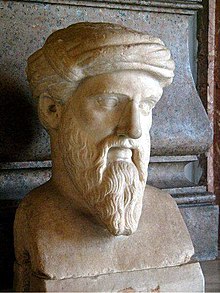Pithagoras
| Pythagoras | |
|---|---|

|
|
| Born |
c. 570 BC Samos |
| Died | c. 495 BC (aged around 75) Metapontum |
| Era | Ancient philosophy |
| Region | Western philosophy |
| School | Pythagoreanism |
|
Main interests
|
|
|
Notable ideas
|
|
|
Influences
|
|
|
Influenced
|
|
Pythagoras of Samos (US /pɪˈθæɡərəs/;UK /paɪˈθæɡərəs/;Greek: Πυθαγόρας ὁ Σάμιος Pythagóras ho Sámios "Pythagoras the Samian", or simply Πυθαγόρας; Πυθαγόρης in Ionian Greek; c. 570 – c. 495 BC) was an Ionian Greek philosopher, mathematician, and putative founder of the Pythagoreanism movement. He is often revered as a great mathematician and scientist and is best known for the Pythagorean theorem which bears his name.
Legend and obfuscation cloud his work, so it is uncertain whether he truly contributed much to mathematics or natural philosophy. Many of the accomplishments credited to Pythagoras may actually have been accomplishments of his colleagues or successors. Some accounts mention that the philosophy associated with Pythagoras was related to mathematics and that numbers were important. It was said that he was the first man to call himself a philosopher, or lover of wisdom, and Pythagorean ideas exercised a marked influence on Plato, and through him, all of Western philosophy.
...
Wikipedia
